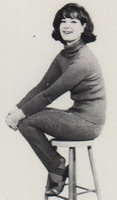Joe Meek - a Portrait Part 9: Voices and extra-terrestrial forces
Heinz again 1965 happened what was bound to happen: Heinz Burt finally got that he wouldn't yield any further benefit from living with Joe Meek. So he found himself a long-time girlfriend named Della and brought her offensively to the studio. And moreover, he sued Meek for missing royalties and wanted to switch over to another producer. Meek, heartstricken, threatened Heinz with calling in at least a part of the money he had invested in him, and he predicted that he (Heinz) would never make another record with any other producer. Probably even Heinz felt that Meek could be right with this prediction. So the two of them came to an agreement: Meek would remain being Heinz' producer, but Heinz would leave 304. He moved to 54 Great Peter Street, Westminster; the apartment was a depreciation object from the portfolio of Meek's business partner Tom Shanks, once Petula Clark had resided there. Meek produced yet another four 45s with Heinz. They were hardly noticed, in mid-1966 finally the chapter Heinz came to an end.
Glenda According to Meek's biographer John Repsch, Meek often saw his being gay as a burden and sometimes hoped he could get "healed" from it. This, also the Heinz crisis, that he sometimes simply had a yearning for a family life and a house with a white-painted fence, and finally that he hoped to get deleted from the police files: All these reasons led Meek early in 1966 to think about a marriage. His choice was singer Glenda Collins with whom he had worked for around three years.
Glenda Collins, circa 1964 Meek's idea wasn't too far out at that time. Several gays and lesbians being in the public eye celebrated a pro-forma marriage, others used to live in a serious matrimony which internally allowed the partners to live their individual requirements. Glenda Collins and Meek liked each other, but of course it was no love attachment. Besides this there was a financial background; Meek apparently hoped that Glenda's father would inject some money into Meeksville Ltd. This combination could only fail.
Paranoia and talking paintings After the breakup with Heinz and the ill-fated marriage plans, Meek not only lost the plot more and more, he seemed to go over the deep end. He was convinced his landlords wanted to terminate the tenancy agreement (nothing in this direction is known, even he was in arrears with his rent from time to time), and he fell out with collaborators and the few remaining friends for no reason. Even Geoff Goddard gave up completely now - he felt threatened in 304 and left forever. Meek's paranoia grew into the absurd after in a suburb the horrible mutilated corpse of a seventeen-year old boy was found. This finding started one of the most massive police operations Great Britain had ever seen, and Meek who apparently had known this boy was sure the police suspected and watched him. Even Buddy Holly and all the other patron saints who always had helped him by ouija board or on séances seemed to turn against him now or left him completely. Meek began to hear sidetones on his recordings which he thought could only be caused by hidden bugging devices; to find the bugs he tore off the wallpapers. And he was sure his landlady, Violet Shenton, eavesdropped on him through the chimney every night - by order of competiting record companies and other "rotten pigs". As he confided to a friend, he often heard a creature creeping around his bed when it was dark in the bedroom at night; he said his voice wasn't his own anymore, he felt traced by extra-terrestrial forces controlling his thoughts, and when being alone in the apartment at night, sometimes paintings on the wall would speak to him, but he couldn't understand what they were saying.
Chaos, overdrawn accounts and tax fraud investigators The sidetones Meek believed to hear on his recordings may have been his own tinnitus. Maybe at night, when it was silent in the house, he heard sounds and voices from the neighboring apartments. But in view of his long lasting abuse of uppers and downers it is well possible that his overstrung nerves had begun to produce real hallucinations already. In all this chaos Meek went on producing music, day by day. Some recordings from this era are among his best. The music productions were expensive but didn't yield much money anymore. To make matters worse, the tax office field investigators paid a visit to him. They wanted to see the business records - which of course nobody had cared about since Meek had fired "Major" Banks. In mid-1966 all private and business accounts were overdrawn to maximum limits. In the end of 1966, Meek finally had no choice anymore than to steal food. Only his suits were shipshape as ever - somehow he always managed to do that.
Sources see chapter 13 [Home] [Complete Recordings] [Triumph Story] [CD Discography] [Noten/Scores] [Telstar Cover Versions] [Meek in Germany] [Literature, Documentaries etc.] [Miscellaneous] [Contact]
© 2006 Jan Reetze last update: Aug 20, 2010
|

